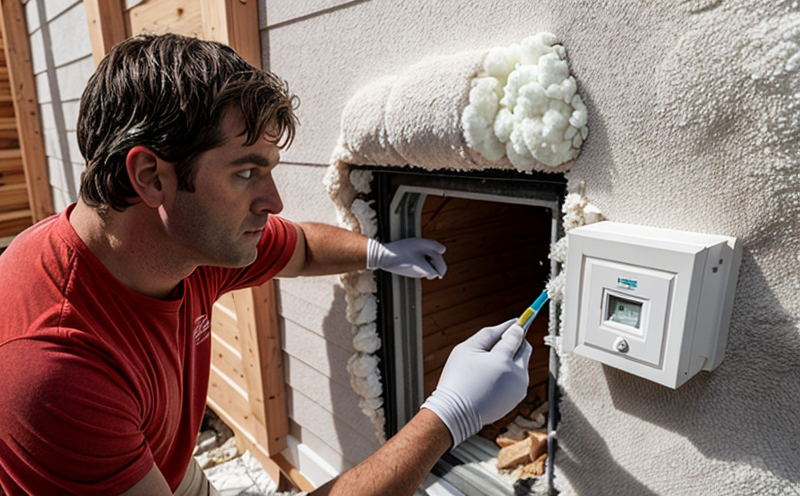ISO 6946 Calculation of U-Values for Walls
The ISO 6946 standard provides a method for calculating the thermal transmittance (U-value) through building elements, including walls. This service is essential for ensuring compliance with energy efficiency regulations and achieving sustainable construction practices.
Thermal performance of buildings plays a crucial role in reducing heating and cooling costs while minimizing environmental impact. The U-value is a key metric that quantifies the rate of heat transfer through a material or assembly under specified conditions. A lower U-value indicates better thermal insulation, leading to enhanced energy efficiency.
For walls, the ISO 6946 calculation involves several steps and considerations:
- Material Properties: Determine the thermal conductivity (λ) of each material used in the wall. This includes insulation materials like mineral wool or expanded polystyrene.
- Thermal Bridging: Evaluate potential thermal bridges that could compromise the integrity of the wall's insulation layer.
- Construction Details: Account for the thickness and arrangement of different layers in the wall, such as insulation sandwiched between structural elements.
The calculation process is iterative, requiring careful consideration of all factors that influence heat transfer. Compliance with ISO 6946 ensures accurate U-value determination, which is vital for achieving desired energy performance levels.
Our team specializes in providing comprehensive support to ensure your construction projects meet the stringent requirements set by this standard. We offer detailed analysis and reporting tailored to your specific needs, helping you stay ahead of regulatory changes and market demands.
Applied Standards
The ISO 6946:2017 standard is widely recognized for its comprehensive approach to calculating U-values. This internationally accepted methodology ensures consistency across various applications, from residential housing to commercial buildings.
Besides the core requirements of ISO 6946, additional standards such as EN 12856-3 may be referenced depending on local regulations or project-specific requirements. These complementary guidelines provide further detail on specific aspects like thermal bridges and non-uniform wall components.
Our laboratory adheres strictly to these standards, ensuring that all calculations adhere to the highest quality assurance practices. This commitment guarantees accurate U-value determinations that align with global best practices in energy-efficient building design.
Industry Applications
The ISO 6946 calculation of U-values is integral to several key areas within the building and infrastructure sector:
- Energy Efficiency Audits: Identifying opportunities for improving insulation quality in existing structures.
- New Construction Projects: Ensuring all elements meet current energy performance targets before final approval.
- Material Selection: Guiding the choice of appropriate insulation materials and their correct application.
- Compliance Verification: Providing evidence for regulatory compliance, particularly in regions with stringent environmental laws.
By leveraging ISO 6946, stakeholders can make informed decisions that balance cost-effectiveness with long-term sustainability goals. Our expertise ensures that every project benefits from meticulous attention to detail and rigorous testing protocols.
Quality and Reliability Assurance
- Accurate Data Collection: Utilizing advanced measurement techniques to gather precise thermal data.
- Standardized Procedures: Following internationally recognized procedures to ensure consistency in all calculations.
- Comprehensive Reporting: Providing detailed reports that offer insights into potential areas for improvement.
- Ongoing Validation: Regularly updating and validating methods against latest industry standards.
We maintain strict quality control measures throughout the entire testing process, ensuring high reliability and accuracy in every U-value determination. Our commitment to excellence is reflected in our adherence to ISO 6946 and other relevant international norms.





